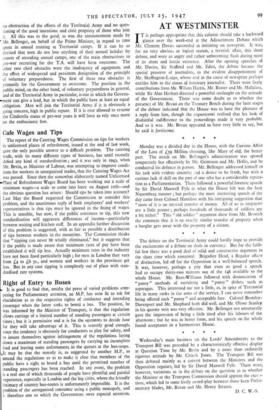Cafe Wages and Tips
The report of the Catering Wages Commission on tips for workers in unlicensed places of refreshment, issued at the end of last week, gave the only possible answer to a difficult problem. The catering trade, with its many different types of business, has until recently defied any kind of standardisation ; and it was only in 1943, when Mr. Bevin, as Minister of Labour, was attempting to improve condi- tions for workers in unorganised trades, that the Catering Wages Act was passed. Since then the somewhat elaborately named Unlicensed Place of Refreshment Wages Board has been working out a scale of minimum wages—a scale to come into force on August nth—and the obvious question has arisen: Should tips be taken into account? Last May the Board requested the Commission to consider this problem, and the unanimous reply of both employers' and workers' representatives is that tips must be ignored in the fixing of wages. This is sensible, but now, if the public continues to tip, this new standardisation will aggravate differences of income—particularly between waiting and kitchen staff. In an appendix further discussion of this problem is suggested, with as fair as possible a distribution of tips between workers in the meantime. The Commission thinks that " tipping can never 1* wholly eliminated," but it suggests that if the public is made aware that minimum rates of pay have been established it will tip less. Actually minimum rates in the industry have not been fixed particularly high ; for men in London they vary from £4 to £6 5s., and women and workers in the provinces get less. But in any case tipping is completely out of place with stan- dardised rate systems.


































 Previous page
Previous page